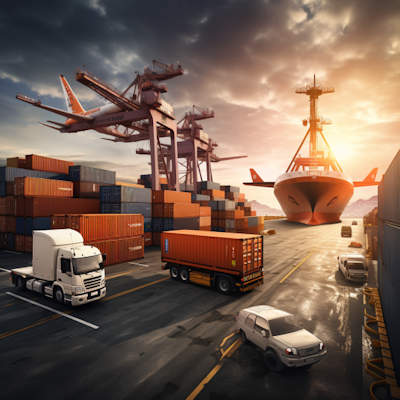The Future of Freight Forwarding: Exploring Innovations in Technology and Automation

Freight forwarding, a cornerstone of global commerce, stands at the precipice of revolutionary change. With the exponential rise of technology and automation, this industry, which historically relied on vast paperwork and manual tracking, is undergoing a dynamic transformation. As we look ahead, it’s apparent that these technological innovations aren’t merely nice-to-have but are integral to shaping a resilient, efficient, and transparent future for freight forwarding.
* Please send feedback/suggestions to editor @ shipuniverse.com
1. The Digital Wave in Freight Forwarding
The term ‘digital freight forwarder’ has become more prevalent in recent years. Unlike traditional freight forwarders, digital forwarders leverage technologies to simplify the shipping process. Platforms like Flexport and Freightos have heralded this change, offering digital platforms that provide real-time shipment tracking, instant quotes, and streamlined communication. With digital platforms, gone are the days of tedious back-and-forth emails and calls. Now, businesses can have immediate access to freight rates, routes, and shipment statuses at their fingertips.
2. Automation in Warehousing
Warehouses, the starting point of the freight journey, are becoming increasingly automated. Robotics and AI-driven systems are assisting in picking, packaging, and inventory management. These robots can work tirelessly, optimizing storage space and ensuring orders are processed rapidly and with pinpoint accuracy.
Amazon, the e-commerce giant, is at the forefront of this automation drive. Its warehouses deploy ‘Kiva’ robots that move shelves of products to human workers. These automated systems drastically reduce the time taken to process an order, ensuring quicker dispatches and, ultimately, happier customers.
3. IoT and Real-time Shipment Tracking
The Internet of Things (IoT) is another innovation that’s creating ripples in freight forwarding. Smart containers equipped with sensors now provide real-time updates about their location, temperature, humidity, and even if they’ve been tampered with. Such a level of detail was unfathomable a few years ago.
This real-time data not only enhances transparency but also allows companies to act immediately if something goes awry. For perishable goods like pharmaceuticals or fresh produce, such monitoring can mean the difference between a successful shipment and significant losses.
4. Blockchain: The Promise of Secure and Transparent Transactions
Blockchain, the technology behind cryptocurrencies, is gradually making its mark in freight forwarding. By offering an immutable ledger of transactions, blockchain ensures that every stakeholder in the shipping process, from shippers to end-users, can trace the journey of a product.
Smart contracts embedded within the blockchain can automatically validate a transaction when specific conditions are met. This feature can significantly reduce time-consuming paperwork and the risk of manual errors, leading to faster and more secure transactions.
5. Autonomous Vehicles and Drones
While still in nascent stages, the potential of autonomous trucks and drones in reshaping freight forwarding is undeniable. Driverless trucks could revolutionize over-the-road transport, making it safer and more efficient. Drones, on the other hand, are being tested for last-mile deliveries, especially in remote areas.
These technologies, when combined with advanced AI algorithms, can optimize routes based on real-time traffic data, ensuring faster deliveries and reduced operational costs.
6. 3D Printing and Localized Manufacturing
Although not a direct freight technology, 3D printing has significant implications for the industry. As more businesses adopt this technology, there will be a shift towards localized manufacturing. Instead of shipping products across the globe, companies might just transmit a digital blueprint which can be printed locally. This shift will undoubtedly change the volume and nature of goods being shipped.
Conclusion: Embracing the Future
The freight forwarding industry, characterized by its intricate networks and coordination, is poised to leap into a more streamlined, transparent, and efficient era, courtesy of technology and automation. While challenges, especially regarding standardization and regulations, remain, there’s an air of optimism.
As the lines between technology companies and freight forwarders blur, one thing is crystal clear: those who adapt and embrace these innovations will not only survive but thrive in the ever-evolving global marketplace. The future, illuminated by digital breakthroughs, beckons the freight forwarding industry with open arms. And for the forward-thinkers, the journey ahead is nothing short of exhilarating.

Do you have a Maritime Product or Service that may be of interest to Shipowners? Tell us about it here!
Do you have feedback or insights? Please reach out to editor @ shipuniverse.com



